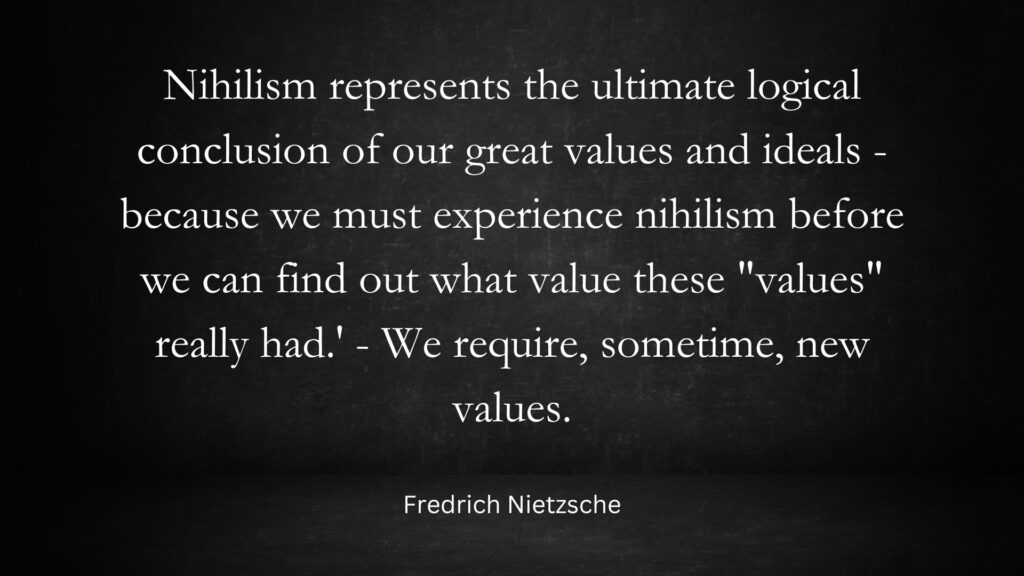Nothing matters to the universe,
Nor does the universe matters for anything,
It’s an infinite meaningless entity,
Runs with a reason or without it,
And thinks we humans are nothing, Merely the insignificant stains
You often read this line or similar ones “Everything is meaningless; the universe, the life, and the humans.” What comes to your mind? A person’s gloomy, stressful, despairing, or pessimistic remarks. It’s a nihilistic school of thought or philosophical approach that rejects or denies the existence of values, purpose in life, or objective meaning of everything. Although it emerged in Europe in the 18th and 19th centuries, Nihilism is still popular worldwide. People consider that nihilism is only the denial of moralism of religion or the existence of supreme authority, but studies show that Nihilism has no restrictions like that. It is a broad ocean of knowledge, and philosophers divide this wide school of thought into five studies with distinct views and positions. To get an understanding of these studies, keep reading our detailed guide.
Nihilism and Believers
You will find this term in various fields like philosophy, literature, and psychology, and people have discussed and debated it for centuries. But finding a real nihilist around you is the rarest thing. Because the term is much popular and takes many shapes, people only like to talk about this school of thought. In addition, if you want to see some examples, then literature has some great fictional characters who are nihilists and have been influenced by various nihilistic ideas in one way or another. Some of them are here.
- Raskolnikov from “Crime and Punishment” by Fyodor Dostoevsky
- Tyler Durden from “Fight Club” by Chuck Palahniuk
- Anton Chigurh from “No Country for Old Men” by Cormac McCarthy
- The Joker from “The Dark Knight” by Christopher Nolan
- Holden Caulfield from “The Catcher in the Rye” by J.D. Salinger
Basic Principles of Nihilism
As a philosophical belief, nihilism focuses on rejecting the existence of any meaning and believes that values are baseless. That’s why it is often associated with the radical skepticism which questions the possibility and reality of knowledge and communication. Studies also associated Nihilism with extreme pessimism, thus rejecting even the value of existence.
Though, as I mentioned above, there are five nihilist studies, when it comes to principles of nihilism, the basics are the same in all forms of it. The forms are different, but the discussion on humans and their existence is the primary topic in all of them.
- Useless: Everything in this universe is baseless, worthless, and pointless; even the values and beliefs are purposeless. So, when nothing has a purpose, why make efforts to make and implement them?
- Truthless: When everything is useless, baseless, purposeless, even the truth itself, there is no justification to maintain moral principles, either for oneself or others.
- Meaninglessness: There is nothing that has a meaning, and nothing matters to us, nor do we matter to anything. Even life has not a single meaning.

Misconceptions About Nihilist
A nihilist is a person who rejects the inherent values or meanings of traditional values and beliefs, moral and ethical principles, religion, life, and the universe.
This definition has a point, but it’s not the whole picture. The term nihilism is broad, but most sources define it only in one way. It is essential to approach and understand the concept of nihilism with nuance and avoid oversimplifying it. However, this behavior toward the nihilistic school of thought gives birth to many misconceptions, and people hardly try to shatter them. Some misconceptions that are associated with nihilism and nihilist personality are given below.
- They never believe in the existence of anything.
- They never believe in the existence of religion and the universe.
- They never show any loyalty toward anything, not even toward themselves.
- They have no purpose except having an impulse to destroy themselves and others.
- They reject moral and ethical principles.
- It is a destructive or negative philosophy that leads to despair and hopelessness.
Let’s have a look at some points that shatter the commonly-held myths.
- A nihilist is a person who believes in the existence of things but rejects their inherent meaning or value.
- A nihilist is a person who
- Can believe in God and the universe,
- Can totally deny their existence,
- Can, instead, have no opinion
- A nihilist is a person who is loyal toward people, things, or causes but they don’t believe in their inherent value or meaning.
- A nihilist is a person who may feel a sense of purposelessness or detachment from society’s norms and values. While some nihilists may have the desire to destroy societal structures, it does not necessarily imply that they actively seek destruction.
- A nihilist is a person who questions the traditional moral and ethical principles and norms, and values that are limited or oppressive and think of creating new ones.
- It is a liberating philosophy that encourages people to ponder over meaning and existence, tries to get a sense of freedom and empowerment, and create their own meaning, values, and goals based on their perspective and personal experience and ultimately find the purpose of life.
5 Historical Figures In Favor Of Nihilism
Nihilism as a philosophy emerged early; still, history doesn’t have the correct name or year of the term’s origin, so it needs to be discovered. But scholars started using this term in the 18th century, and in the following century, meaning 19, the term became popular among philosophers and thinkers. I have listed and discussed the top 5 historically known figures associated with the term nihilism or who critiqued it.
Friedrich Jacobi (1743–1819)
Though the term has its roots in Buddhism and even Socrates’s work, Friedrich Jacobi is the first person who came up with the term after the period of Enlightenment. This intellectual movement emerged with the philosophies of skepticism, individualism, and reason.
Many scholars favored rationalism and ultimately rejected the traditional religious, social, and political ideas, which filled Jacobi with fear, as he thought that rationalism would give birth to Nihilism by devaluing the human sense of self.
That’s why he coined and discussed the term and is famous as the critique of Nihilism, which thinks this philosophy is dangerous and destructive and causes despair, apathy, and even moral degeneracy.
Søren Kierkegaard (1813–1855)
Kierkegaard, a Danish theologian and a Father of Existentialism called this term leveling. But his views were against this philosophy. He considered it bad as he was religious and regarded despair as a key to experience and anxiety as a sign of freedom.
According to him, the only way to human safety and success was by embracing the absurdity of existence and living a life guided by faith. Though his views were complex and multifaceted, his legacy remains a subject of ongoing debate and interpretation; he is one of the great critics of Nihilism.
Ivan Turgenev (1818–1883)
The term attained popularity when it was used by Russian novelist Ivan Turgenev in 1862 in his novel Fathers and Sons. He explored the cynicism of Russian youth of the 19th century and discussed their questioning of traditional beliefs, philosophical ideas, and authority figures.
The term later became part of the Russian movement and focused on reevaluating preexisting societal ideals and advocating for radical change. Altogether it emerged as a Russian Nihilism.
Friedrich Nietzsche (1844–1900)
Though Nietzsche was a German philosopher who influenced Western philosophy, he was famous for his nihilistic statement. However, he did not favor it because he believed that nihilism philosophy is a terrifying and destructive problem and must be overcome if people create their own values.

Albert Camus (1913–1960):
Nihilism and absurdism are both interlinked, and Albert Camus was a french philosopher who often discussed the term absurdism in his work. He was famous for this existentialist question he asked about life and death, which both absurdists and nihilists could answer. There is a 99% probability that those answers would be similar.
5 Theories of Nihilism
Most people are familiar with existential and cosmic Nihilism, as both are leading theoretical practices and are more common today. However, as deep studies, the term is still in the exploration period and is used widely in various contexts. Nihilism is vague and ambiguous still; it has five primary forms, which I discussed below.
Existential Nihilism
Existential Nihilism addresses that life has no intrinsic value and is insignificant and purposeless. Still, a person can create meaning through their choices and decisions.
The research mainly associates existential Nihilism with impulsive and destructive behavior and suicide. But remember, existential Nihilism is a separate school of thought and only overlaps existentialism but does not advocate the same idea. You can see the term in Jean-Paul Sartre’s work.
Cosmic Nihilism (Cosmic Pessimism)
It’s a more hyper-rational school of thought which advocates that truth has no meaning; it is meaningless in this universe.
Moreover, it also states that human emotions and relationships like love, joy, freedom, friends, and family everything is fiction. They are nothing but a person’s attempts to cope with things until he dies.
Epistemological Nihilism
Studies associate this school of thought with extreme skepticism. This school advocates that knowledge doesn’t exist. It is its first and extreme state, but with slight modification, and as a second thought, it believes that it exists but simultaneously states that knowledge is unobtainable to human beings believing it as redundant to pursue it.
Political Nihilism
This school of thought focuses on society’s improvement but also believes in destruction. According to it, future improvement is only possible if we destroy the present political, social, and religious institutions because they are all so corrupt that we can’t bring positive results in their presence.
Ethical Nihilism (Moral Nihilism)
Ethical Nihilism, also known as moral Nihilism, is a philosophical view that asserts the absence of objective right or wrong. It encompasses three main ideas that are amoralism, moral subjectivism, and egoism.
Amoralism completely rejects all moral principles and advocates for living life without any moral values.
Moral subjectivism, on the other hand, suggests that moral judgments are entirely subjective, based on personal opinions, tastes, and feelings, and do not demand any rational justification or criticism.
Egoism emphasizes that an individual’s only obligation is to themselves, and they need not worry about any behavior that does not harm their private interests.
Conclusion
Nihilism is a school of thought that has been used in several contexts. However, though each position has a clear definition still, the beliefs and actions vary from person to person or philosopher to philosopher.
















